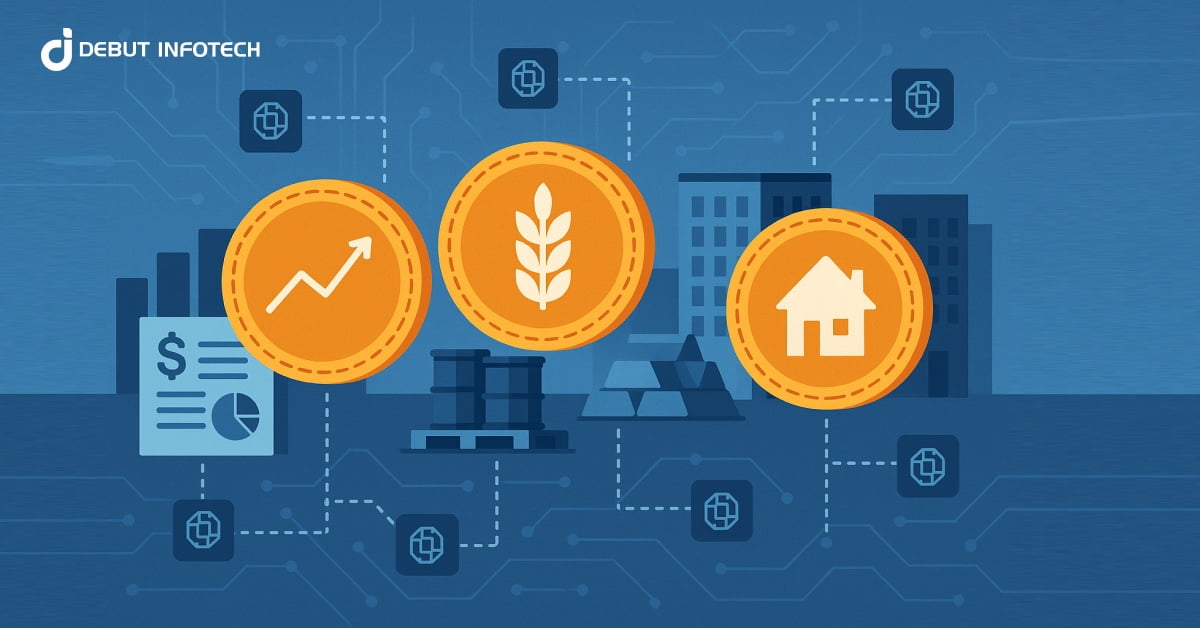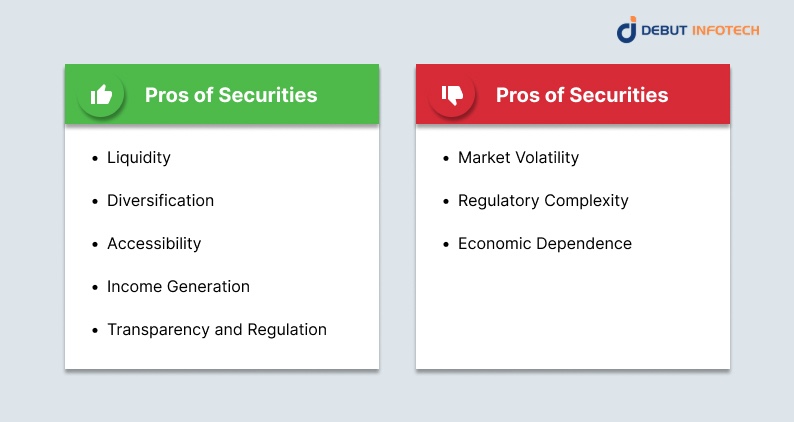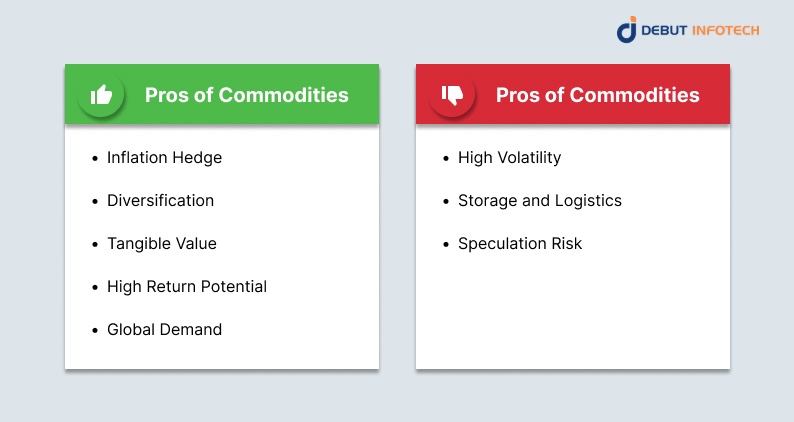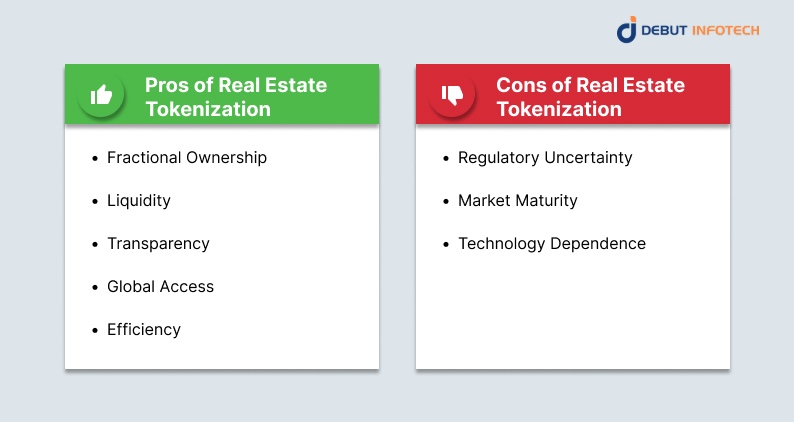Table of Contents
Home / Blog / Tokenization
Securities, Commodities, and Real Estate Tokenization: Key Differences Every Investor Should Know
October 6, 2025

October 6, 2025
Modern investing has become a crossroads where securities, commodities, and real estate tokenization often meet—blending time-tested markets with emerging digital assets. Each brings its own perks and pitfalls across traditional and digital frontiers.
According to the Financial Times, the global stocks and bonds markets vaulted to a record $255 trillion in 2024, underscoring securities’ dominance. Commodities trading value pools nearly doubled—rising from $27 billion in 2018 to $52 billion by 2021 in earnings, per a report from McKinsey & Company. Meanwhile, the real estate tokenization market—though nascent—was valued at $2.7 billion in 2022 and is projected to soar to $16 trillion by 2030.
In this guide, we will examine securities, commodities, and real estate tokenization in-depth. We will cover their pros, cons, and major differences to help investors understand modern asset classes.
Ready to Build Cross-Asset Marketplace?
Whether securities, commodities, or real estate, we develop platforms that let you trade tokenized assets in one unified ecosystem.
What are Securities?
Securities are financial instruments that represent ownership (stocks), creditor relationships (bonds), or rights to ownership (derivatives). They are regulated assets traded in financial markets, enabling individuals and institutions to invest, raise capital, and manage risks in structured ways.
Pros of Securities

1. Liquidity
Securities are highly liquid, allowing investors to quickly buy or sell through established exchanges. This ease of entry and exit makes them attractive for managing short-term needs while still pursuing long-term growth.
2. Diversification
Securities offer broad diversification opportunities across industries and regions. By spreading investments, they reduce exposure to single-market risks and help create more resilient, balanced portfolios over time.
3. Accessibility
With regulated markets and digital platforms, securities are widely accessible. Investors of varying experience levels can participate with modest capital, making them a cornerstone of inclusive investment opportunities worldwide.
4. Income Generation
Stocks can pay dividends, and bonds provide fixed interest. These income streams appeal to investors seeking consistent returns in addition to potential portfolio growth, balancing both short-term and long-term goals.
5. Transparency and Regulation
Securities markets are heavily regulated, requiring companies to disclose performance and financial health. This transparency builds investor confidence and provides clearer insights for making informed investment decisions.
Cons of Securities
1. Market Volatility
Securities are highly sensitive to market shifts and global events. Prices can fluctuate quickly, exposing investors to risks that may impact portfolio value in short timeframes.
2. Regulatory Complexity
Strict regulations require compliance and careful oversight. For new investors, navigating disclosures, taxation, and compliance rules can be challenging and sometimes discouraging.
3. Economic Dependence
The performance of securities is closely tied to overall economic health. Recessions or downturns can significantly reduce value, making securities vulnerable during unstable periods.
Related Read: Top 6 Challenges in RWA Tokenization
What are Commodities?
Commodities are raw materials or primary goods such as oil, gold, wheat, and natural gas. Unlike securities, they derive value from physical supply and demand dynamics rather than ownership claims. Investors trade commodities to diversify portfolios, hedge against inflation, or speculate on price changes.
Pros of Commodities

1. Inflation Hedge
Commodities often rise in value when inflation increases. This makes them a protective hedge, preserving purchasing power while stabilizing portfolios during times of rising consumer prices.
2. Diversification
Adding commodities reduces portfolio reliance on stocks and bonds. Their prices often move differently from traditional assets, creating a balanced mix that lowers overall investment risk.
3. Tangible Value
Unlike financial assets, commodities like gold, oil, or crops have physical utility. Their intrinsic value provides investors with reassurance and long-term demand stability.
4. High Return Potential
Price swings in commodities can generate significant returns. For investors willing to embrace risk, volatility creates opportunities to profit from short- or medium-term market movements.
5. Global Demand
Essential commodities such as energy, metals, and food enjoy steady global demand. This enduring necessity ensures ongoing relevance and long-term value, regardless of economic cycles.
Cons of Commodities
1. High Volatility
Commodity prices are highly volatile, influenced by weather, supply shocks, or geopolitical issues. These unpredictable swings can pose substantial risks to unprepared investors.
2. Storage and Logistics
Physical commodities often require costly storage, transportation, and insurance. These expenses reduce profitability, making direct investment more complex than paper-based assets.
3. Speculation Risk
Commodity markets attract heavy speculation. Price movements driven by trader sentiment can detach from supply-demand fundamentals, exposing investors to unpredictable losses.
What is Real Estate Tokenization?
Real estate tokenization is the process of converting ownership rights of property into digital tokens on a blockchain. These tokens represent fractional ownership, enabling investors to buy, sell, and trade real estate assets more efficiently and transparently on real estate tokenization platforms.
Pros of Real Estate Tokenization

1. Fractional Ownership
Tokenization allows investors to buy fractions of properties, reducing barriers to entry. Smaller investments make real estate accessible to more people without requiring large upfront capital.
2. Liquidity
Tokenized assets can be traded on secondary markets. This liquidity provides flexibility for investors, who can exit positions more easily than traditional real estate.
3. Transparency
Blockchain-based tokenization ensures transparent ownership records and transactions. This reduces fraud risks and builds investor confidence in the authenticity and security of property investments.
4. Global Access
Investors worldwide can easily tokenize real estate commodities. This fluidity of the tokenization of real estate assets expands reach, creating opportunities beyond local boundaries and opening new avenues for cross-border investment.
5. Efficiency
Smart contracts automate processes like dividend distribution and compliance. This efficiency reduces administrative costs, streamlines transactions, and enhances investor returns over time.
Also Read: Real Estate Tokenization Platform Cost
Cons of Real Estate Tokenization
1. Regulatory Uncertainty
Global regulations on tokenized assets are still developing. Investors and even the best investment platforms for tokenized commodities face risks from unclear or shifting legal frameworks, which may affect compliance, ownership rights, and market acceptance.
2. Market Maturity
The tokenized real estate market is relatively young. Limited adoption and trading volumes may affect liquidity and long-term stability for early investors.
3. Technology Dependence
Tokenization relies heavily on blockchain systems. Any technical failures, hacks, or vulnerabilities can undermine trust, posing significant risks for RWA tokenization companies, investors and asset issuers.
Securities vs Commodities vs Real Estate Tokenization: Key Differences
| Aspect | Securities | Commodities | Real Estate Tokenization |
| Nature | Financial instruments like stocks and bonds representing ownership or debt. | Physical goods such as gold, oil, or agricultural products. | Digital tokens representing fractional ownership in real estate assets. |
| Liquidity | Highly liquid, easily traded on established exchanges. | Moderate liquidity, varies by market and commodity type. | Increasing liquidity through token exchanges, but still developing. |
| Income Potential | Can generate dividends or interest in addition to appreciation. | No direct income; value depends on price movement. | Offers rental income distribution via tokens and value appreciation. |
| Accessibility | Widely accessible to retail and institutional investors. | Accessible but often requires expertise and higher risk tolerance. | Broad global access with lower entry costs through fractional ownership. |
| Regulation | Heavily regulated, ensuring transparency and investor protection. | Regulated but often influenced by global supply-demand dynamics. | Evolving regulatory framework, varies across jurisdictions. |
1. Nature
Securities
Securities are financial instruments that represent ownership in companies (stocks), debt obligations (bonds), or derivative contracts tied to performance. They are intangible assets, existing as contracts and traded electronically, governed by established financial systems. Their nature lies in representing claims rather than physical or tangible goods.
Commodities
Commodities are raw materials or primary goods like oil, gold, or wheat that carry intrinsic value due to real-world utility. They are physical, tradable, and consumed globally. Unlike securities, commodities derive value directly from supply-demand dynamics, making them essential, tangible assets tied to global consumption and production.
Real Estate Tokenization
Real estate tokenization digitizes property ownership by issuing blockchain-based tokens that represent fractional stakes in real estate. Unlike securities or commodities, real world asset tokenization combines tangible physical backing with digital representation, creating a hybrid form of ownership that blends real property with modern blockchain infrastructure.
2. Underlying Value
Securities
The value of securities depends on the financial health, earnings potential, or creditworthiness of the issuing company or government. Stock values reflect profitability and market growth, while bonds depend on repayment reliability. Their worth ultimately ties back to institutional performance and the broader economic environment.
Commodities
Commodities draw value from practical utility and scarcity. Gold is prized for its durability, oil fuels energy demands, and wheat feeds populations. Their prices shift with global supply-demand imbalances, geopolitical events, and weather patterns. Value is rooted less in corporate performance and more in essential consumption.
Real Estate Tokenization
Tokenized real estate derives value from the underlying physical property’s market worth, rental income, and appreciation potential. Blockchain merely represents ownership digitally, but the real driver is tangible real estate. The tokens’ value fluctuates alongside property trends, investor demand, and the local housing or commercial market.
3. Liquidity
Securities
Securities are among the most liquid asset classes, especially stocks and bonds traded daily on exchanges. Investors can buy or sell with relative ease, often within seconds. Liquidity ensures efficient price discovery and flexibility, making securities highly attractive for both short-term traders and long-term investors.
Commodities
Commodity liquidity varies widely. Gold and oil are actively traded with deep markets, ensuring quick transactions. However, niche agricultural products may have less liquidity. Futures contracts improve trading efficiency, but commodities are still less consistently liquid than securities, especially during supply disruptions.
Real Estate Tokenization
Tokenized properties enhance liquidity compared to traditional real estate, but availability still depends on active secondary markets. Unlike stocks or major commodities, security tokenization assets lack widespread exchange participation. Liquidity is improving but remains limited, meaning investors may face difficulties selling tokens quickly when demand slows.
4. Accessibility
Securities
Securities are highly accessible through global stock markets, brokerage platforms, and mobile trading apps. Minimum investment thresholds are low, making them available to small retail investors and institutions. Accessibility has grown further with ETFs and fractional share programs, democratizing participation in financial markets.
Commodities
Commodities can be accessed directly (buying gold, silver) or indirectly (futures, ETFs, mutual funds). However, some commodities, like oil or agricultural products, are more complex for individual investors to handle physically. Access is more straightforward through financial instruments, but it can remain less convenient than securities markets.
Real Estate Tokenization
Real estate tokenization dramatically increases accessibility by lowering entry barriers to property investment. Through fractional ownership real estate tokenization tokens, investors can commit smaller amounts to high-value assets, bypassing the need for large down payments. Online real estate tokenization platforms enable global participation, making property ownership more inclusive than traditional methods.
5. Regulation
Securities
Securities operate under strict regulations from authorities like the SEC in the U.S. and ESMA in Europe. These frameworks ensure transparency, protect investors, and maintain orderly markets. Regulation provides investor confidence, though compliance requirements can be complex, particularly for companies raising capital through securities issuance.
Commodities
Commodity markets are regulated, but frameworks differ globally. Futures and derivatives often fall under financial regulators, while physical trade is influenced by trade laws, tariffs, and government policies. Regulation is less uniform than securities, leaving certain commodities more vulnerable to price manipulation and geopolitical interference.
Real Estate Tokenization
Tokenized real estate faces significant regulatory uncertainty. Rules vary by jurisdiction, with some classifying tokens as tokenized securities, others as property rights, or lacking clarity altogether. This evolving environment creates compliance challenges but also opportunities, as clearer regulations could legitimize and accelerate adoption worldwide.
6. Risk Factors
Securities
Securities are vulnerable to market volatility, economic downturns, and interest rate shifts. Stocks fluctuate with investor sentiment and company performance, while bonds react to inflation and credit risks. Though diversification reduces exposure, securities remain tied to broader financial cycles, leaving investors exposed to systemic risks.
Commodities
Commodities face risks linked to unpredictable supply-demand shocks, weather changes, and geopolitical tensions. Oil prices may spike due to conflicts, while crops can fail due to droughts. Heavy speculation also amplifies volatility, making commodities a riskier asset class for those unprepared for sudden price disruptions.
Real Estate Tokenization
Tokenized properties face unique risks, blending real estate market uncertainties with blockchain vulnerabilities. Property values fluctuate with demand and economic cycles, while smart contract errors or cyberattacks pose technological threats. Additionally, unclear regulations add legal risk, making tokenized assets a complex investment choice.
7. Transparency
Securities
Securities markets are generally transparent, with regulated exchanges providing price visibility, financial disclosures, and audited reports. Public companies must release earnings and comply with strict governance standards. Yet, insider trading and market manipulation risks still exist, meaning transparency, while strong, is not absolute.
Commodities
Transparency in commodities varies by product and market. Futures markets offer standardized reporting, but physical markets can lack clarity. Prices may be influenced by opaque supply agreements, cartels, or political intervention. While data is available for major commodities, smaller markets often remain less transparent.
Real Estate Tokenization
Tokenized assets enhance transparency through blockchain records, which are immutable and publicly verifiable. Every ownership transfer or contractual detail is logged permanently. This reduces disputes and builds investor confidence. However, transparency still depends on reliable property valuations and governance beyond blockchain’s technological assurances.
8. Investment Size
Securities
Securities accommodate many investors, from small retail buyers purchasing fractional shares to large institutions trading billions. Low entry points, primarily through ETFs and apps, make them inclusive. Still, significant gains often require larger capital, especially in less liquid or high-value securities.
Commodities
Commodities require varied investment sizes depending on the asset. Precious metals like gold can be bought in small units, while futures contracts demand higher margins and leverage. For individual investors, indirect exposure via ETFs or commodity tokenization funds lowers the entry size, broadening participation opportunities.
Real Estate Tokenization
Real estate tokenization business model drastically reduces investment size requirements. Instead of committing to entire properties or hefty down payments, investors can purchase small fractions through tokens. This inclusivity enables broader participation, giving individuals access to prime assets traditionally reserved for wealthy or institutional players.
Partner With Tokenization Experts
Work with our blockchain development team to launch secure, compliant, and investor-ready tokenization solutions across all asset classes.
The comparison of securities vs commodities vs real estate tokenization illuminates how each asset class brings distinct value: securities deliver depth and liquidity; commodities offer tangible, inflation-hedged exposure; and real estate tokenization introduces groundbreaking fractional, digital access.
Together, they present a spectrum of options for diversified portfolios. As real estate tokenization continues gaining traction, it may redefine property investment alongside traditional markets. Understanding these differences empowers investors to allocate resources with clarity, confidence, and a strategic edge in today’s dynamic financial environment.
FAQs
Q. What is the difference between securities and commodities?
Securities are financial instruments like stocks or bonds representing ownership, debt, or rights to future profits. On the other hand, commodities are physical goods—like gold, oil, or wheat—traded mainly for their or raw value. One is investment-focused, the other resource-focused.
Q. Is it better to be a security or a commodity?
It depends on the context. Securities often attract stricter regulations but also provide clearer investor protections. Commodities are more straightforward assets tied to supply and demand. Neither is “better” outright—it’s about whether you want to emphasize financial growth potential or basic tradeable value.
Q. Are governance tokens securities?
Not always, but sometimes. If a governance token gives holders rights similar to shareholders—like profit claims or decision-making influence—it can be classified as a security. But if it’s mainly for voting on protocol changes without financial rights, it might avoid that label.
Q. Can something be both a security and a commodity?
Yes, under certain circumstances. A digital asset might be treated as a commodity when traded on open markets. Still, regulators could also classify it as a security if it carries features like profit-sharing or investment contracts. It’s a gray area and highly case-dependent.
Q. Are commodities taxed differently than securities?
Yes, they usually are. Securities are often taxed based on capital gains rules, which vary depending on how long you hold them. Commodities can fall under different tax treatment, sometimes with higher rates or special rules. The details depend on jurisdiction and the specific commodity involved.
Q. Which is better between securities, commodities and real estate tokenization?
It depends on your goals. Securities offer established markets and investor protections. Commodities provide tangible value and hedge against inflation. Real estate tokenization, still newer, adds liquidity to property investment. Each has strengths and trade-offs, so it’s about matching them to your strategy.
Talk With Our Expert
Our Latest Insights
USA
Debut Infotech Global Services LLC
2102 Linden LN, Palatine, IL 60067
+1-708-515-4004
info@debutinfotech.com
UK
Debut Infotech Pvt Ltd
7 Pound Close, Yarnton, Oxfordshire, OX51QG
+44-770-304-0079
info@debutinfotech.com
Canada
Debut Infotech Pvt Ltd
326 Parkvale Drive, Kitchener, ON N2R1Y7
+1-708-515-4004
info@debutinfotech.com
INDIA
Debut Infotech Pvt Ltd
Sector 101-A, Plot No: I-42, IT City Rd, JLPL Industrial Area, Mohali, PB 140306
9888402396
info@debutinfotech.com



Leave a Comment